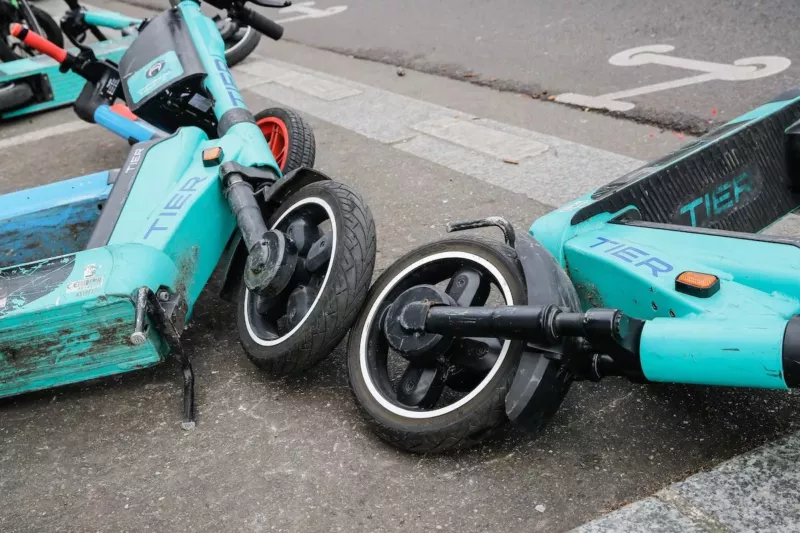
In “Full Time”, a French movie released this year in the United States, the main character is tormented by paralysis — not her own, but Paris’s. The grand French capital and its much less grand suburbs are gripped by strikes that play havoc with public transit and turn roadways into oceans of idling cars. Julie, the young working mother at the center of the action, sprints through streets, thumbs rides on highways and squeezes into packed buses, but still she is delayed, deflated and defeated. Immobility bears down on her like France’s famous high-speed train, the TGV. (Not that it’s moving, either.)
If only she’d hopped on a rental scooter! Paris has had thousands of them for the past five years, and, man, do they move. Even with a top speed of 12 mph, they zip along streets and sidewalks, startling pedestrians and, all too often, colliding with them. As I was crossing the street near the Place de la Bastille the other day, one streaked out of nowhere and passed in a blur maybe six inches from me. I felt like tumbleweed set spinning in a Road Runner cartoon.
Plenty of Parisians have had similarly close calls, or worse, which partly explains the one-sided results in a referendum this weekend. Nearly 90 percent of voters in the city said “non” to the 15,000 rentable scooters that are a godsend for young people and tourists but a scourge to many of the elderly. Anne Hidalgo, the Socialist mayor of Paris, immediately said they would all be banished by Sept. 1, the date on which the city’s contracts expire with three rental scooter companies.
It didn’t take a public opinion guru to guess the referendum’s outcome. At a polling place across the street from the Panthéon, where I went to take a look at the action on Sunday, the average age of the voters waiting in line was probably north of 60. It’s exactly the demographic that fears the scooters most and uses them least. Young people were nowhere to be seen.
In fact, not many Parisians of any age bothered to cast a ballot — turnout was less than 8 percent of the city’s 1.3 million registered voters. But the lopsided outcome reflected an age disconnect in a city, like many in Europe, that skews old, rich and unaffordable.
Roughly half of Paris’s 2.1 million people are older than 40, and as the city’s population has largely contracted for several decades, the only age cohort that has grown much lately is over 60. In the sprawling suburbs, which are racially and ethnically diverse (and cheaper to live in), younger people are more in evidence. But suburbanites were barred from voting in the referendum. Online voting, which might have tempted more younger Parisians to cast a ballot, was also not allowed.
Paris is already a playground for the rich. The problem with banning rental scooters is that they are a convenient, app-managed, affordable way of getting around town, and getting to work, for people who can’t afford to own a car or, for that matter, their own scooter. (Private scooters were unaffected by the referendum.)
Sure, there are other ways of getting around town — the subway (when strikes don’t interfere with service), bikes, mopeds. But none combines the handiness and speed of scooters at a similar bargain price. Young people, said Sylvain Maillard, a lawmaker in the National Assembly who represents Paris, “are the big losers in this binary vote organized by a municipality which has decided to pit one generation against another”.
Paris is the biggest city to ban the scooters, but not the only one. Parts of metropolitan Atlanta have done so, as did Montreal and, for a year or so, Copenhagen. The impulse is understandable. Not only were hundreds of people injured and several dozen killed in French accidents involving scooters last year, but the collateral damage to Parisian elegance — scooters strewn across sidewalks, scooters lying in the gutter, scooters tossed in the Seine — was a regular topic of dinner table tut-tutting.
Still, something important will be lost when the city’s rental scooters are gone. A device that made this gorgeous, glamorous city a little more user-friendly for many people who often just feel stuck will disappear. And older Parisians, in trying to protect a glorious old place they love, along with themselves, might be doing more harm than they realize. By taking away scooters, they may also be putting the squeeze on the very thing that gives any city its juice and spirit of reinvention: young people, in all their rowdy, racing recklessness.
Lee Hockstader has been a member of The Washington Post’s Editorial Board since 2004. Based in Paris, he focuses on European affairs including the fallout from the war in Ukraine as well as immigration, politics, and social issues. He was awarded The Post's Eugene Meyer Award for lifetime achievement in 2014.

